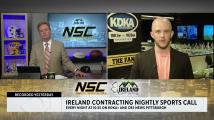The Rush: Ravens star Calais Campbell on Drew Brees, protesting in the NFL and race in America
Walter Payton Man of the Year and Baltimore Ravens defensive end Calais Campbell engages his brother, host of The Rush Jared Quay, in an honest conversation about the worldwide protests sparked by the killing of George Floyd by Minneapolis police officers, the timing of Drew Brees’ comments against kneeling during the anthem, whether monetary reparations for slavery could help even the playing field in society, how he changes his behavior near police as a physically imposing black man, and why he’s optimistic about the future of the country despite the recent turmoil.
Video Transcript
CALAIS CAMBELL: I'm just inspired, man, right now by people wanting to know how they can do more.
JARED QUAY: I wanted to talk to someone who happens to be an NFL player, Calais Campbell of the Baltimore Ravens, but even more so my brother. So we're not going to be normal. This is not-- this is "The Rush" unfiltered. Calais, man, talk to me, man. We need to have a conversation, man. How are you doing right now?
CALAIS CAMBELL: Oh, man, I mean, at the very moment, you know, I mean, I'm happy to see that we're having conversations about real issues that matter, you know, trying to figure out how we can create some positive change. This is the most momentum we've had, you know, the most people speaking out, most people interested in learning more, most people who really want to create change. So I feel like we really have to capitalize on this momentum because, honestly, things have been hard for black people in America from, you know, the first time we stepped foot here in America.
I feel like it's always been that you just don't talk about it. You just-- you know, the conversation didn't really leave the black community too much. And now, for the first time in a while, I feel like the conversation is really out there in front of the whole world. And we really need to make sure that change happens now. And we need people calling their senators and the people the leadership in our community and asking for change now.
And when we unify and we come together, man, you know, anything is possible. It's like being on a great team. You know, when you really come together, and you really work together, yeah, you might not have it figured out at the very beginning, but you work at building blocks and creating something that's special.
JARED QUAY: Drew Brees came out today, and he had a pretty controversial statement, where he said that he doesn't agree with anyone that disrespects the flag. And that maybe is truth, it just seemed like it came at a time where it's kind of going against where everybody's trying to move.
CALAIS CAMBELL: I'm a fan of Drew Brees. I think he has a good heart. I think he means well, but in this situation, he's wrong. That's a peaceful protest, which I feel like, obviously, I think that there are multiple ways to get things done. There are multiple ways to bring change. You know, and the flag is something that carries a lot of weight. I respect the flag. I respect America. I love being American. I'm proud to be an American. But what he represents right now for black folks, you know, is an ideal. And it can be better. And it should be better. And we're demanding better.
And, you know, Colin Kaepernick started a movement that was very interesting. And as you know, I kneeled once before, you know, because I wanted to show people that it was OK to kneel if that's what their choice is. Because as a leader, especially on my team and throughout other teams, you know, I wanted people to know that it was OK if you want to take a stand, and you wanted to try to bring change, because police brutality is important.
It's something that, you know, that means something to us. And you have to bring awareness. You have to keep people talking about it. You have to keep the conversation going. There is a way to go about doing things 100%. He can find a different way of making a difference if he wants to help us. And I hope he does because he has a lot of influence.
JARED QUAY: The truth is, as an athlete, you have a platform. You can use it. But the hard part is that since the beginning of time, athletes who have used their platform for justice have seen a lot of backlash. I mean, if you go all the way back to Muhammad Ali-- when he was doing what he was doing, he was one of the most hated people in the '60s. And so you look at Colin Kaepernick, like, he was a person who was doing well that spoke out about justice. And now he's jobless. Does that scare people like you and other athletes from even one to bring up and risk the fact, you know, the well-being of your family's money to help bring social justice and change?
CALAIS CAMBELL: You know, now's not a time to be scared. You know, when something's important, and enough people do it, you know, you really can't be disciplined. You know, when if it's one person standing up by himself, you know, or two or three people, you could discipline two or three people. But when you go out with a big group, a lot of people behind you, you know, all working together, then you can't discipline everybody.
You know, and that's the thing, like, is we have come together. We need big groups. We need lots of people in the movement. And that's why I feel like I'm more encouraged and more inspired now than I've ever been before because see so many people having the conversation. We're having virtual meetings with the Ravens, and we had a whole meeting, you know, Coach Harbaugh called a whole meeting just so we could discuss what's going on in the community right now and how we can make change, you know. We decided we're going to create a committee that is to help end racism, you know, using our NFL platform. You know, and so those are-- that's a huge mountain we're climbing. You know, we're making a difference.
And so I feel like, you know, the NFL creates a huge platform. And, yeah, you know, we might ruffle some feathers along the way. But at the end of the day, you know, the ultimate goal is worth it.
JARED QUAY: When I see the police, usually they're there to harass. It's the weirdest of situations, but I feel like every time I see the police as a grown black man, I feel like they try to make me feel like I'm a boy. They talk to me in a tone of, "what are you doing? Come here. What are you thing around here?" And if you don't show that you're inferior to them, you get a lot more harassment.
And so that's why I feel like we struggle a lot. And I just know that, from me and you were talking earlier, neither one of us has ever called the police. And that says a lot. What is your opinion when you feel like when you're around the police as being a 6 foot 8, 300-pound man?
CALAIS CAMBELL: Well, I feel like being, you know, a big, black guy, I've always had the mentality of, you know, showing everybody I'm nice, that I'm not a threat. You know, that's been something I had to do since I was young. I mean, I don't even know how I learned it. It just came naturally. When I was in middle school, I realized that when I talk to people, I had to show them I wasn't a threat. I was a nice guy.
And, you know, that definitely is a different level when it comes to police because many things you want to-- I would try to do is make sure that they know I'm not a threat, that I'm going to comply as best I can 'cause, you know, at the end of the day, you know, as a black man in America we are taught at a young age that, you know, that you can lose your life anytime you have an interaction with a police officer.
Now I think because of, you know, the police athletically, and through sports, I had developed incredible relationships with the police officers. So I have a very strong respect for the police force and their job they have to do. I mean, you really risk your life to go out there to protect and serve. But at the same time, that's a responsibility that has to have the ultimate level of accountability. You know, I mean, you have-- you can't make mistakes with that kind of responsibility.
So when people do make mistakes, and it has the consequence of a life that does not deserve to die, you can't just be the juror and executioner on the street and decide that this person deserves to die because his crime, in your opinion, was terrible. I mean, it's not just George Floyd. It happened so many times. And there are so many that never got caught on camera. There has to be legislation that can change.
You know, we've got to hold people more accountable. You should not be able to get 18 complaints against you and still have a job. You know, like, how do you have 18 complaints against you and still have a job? Now I understand that's over a 20-year period, but, I mean, it means that once a year, he keeps making mistakes. It's like, after while, with that responsibility of being a police officer, you should've lost your job. You should be able to do something else, like, hey, maybe this ain't for you.
Honestly, the system has failed us, you know, over and over again, you know, year after year. And I think, you know, it's time for us to make that right, you know. I think reparations is the best way to do that, in my opinion. I know a lot of people think a little differently when it comes to reparations. But, you know, I want to bring it up because I think it's important. You know, I think the contribution that black people have made in America has never really been paid. People who held us captive, people who had us as slaves are no longer alive, you know.
But America really benefited from it. You know, I mean, today, America is the strongest country, by far. You know, we're a powerhouse, and a lot of that was off the backs of slavery. And so I feel like, you know, that's a real conversation to have. You know, I know, you know, it sounds like it's such a big number, and it can't be done. But we just saw, you know, the government print trillions of dollars, you know, in the pandemic for COVID.
So it shows you that the money can come. And it don't have to be over in one year. It could be over, you know, a period of five-- you know, whatever, you know, whatever, you know, the leaders decide. But it definitely needs to happen. We have the ability to change. And I feel like, you know, so many times we're waiting on somebody else to step up to take the reins. And I feel like that's when, you know, you're hoping somebody else does a good job.
But at the end of the day, if you want something done, sometimes you've got to do it yourself. So, you know, I'm calling on you to do more, you know, for me to do more, man, and hold me accountable and make sure I'm doing more. Don't let me get complacent because at the end of the day, it's up to us. If we want change.
JARED QUAY: Well, look, man I'm glad we're having this conversation. I'm glad America's having this conversation. I'm glad you're using your platform to stand up and say something. And hopefully, this makes a better world for both Dekari and Yolanni, our kids to have a better life than we did. And we can grow better from this, man. Thank you for taking the time, man. I appreciate you.
CALAIS CAMBELL: Oh, most definitely, man. You know, it's all love. Thanks for having me.







